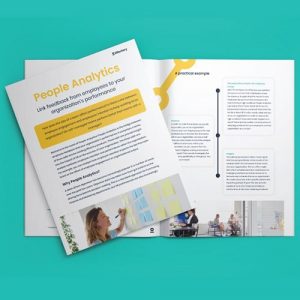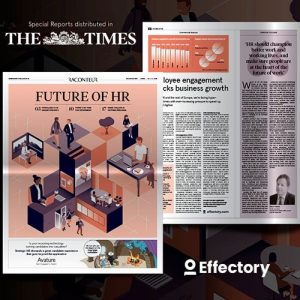Two centuries ago, the Industrial Revolution gave us the possibilities for the innovation and mass production that profoundly changed people’s work-life as they knew it. It also became clear that organizations that adapted quickly to these innovations became more successful than their competition because they had better and improved organizational outcomes: a consistent quality in a higher quantity.
Did you know there is an HR analytics revolution in organizations?

Nowadays with the modern day Technological Revolution, organizations are able to listen to the voice of their employees, and almost continuously. Sometimes hundreds of thousands of voices at the same time, and with increasing frequency too. With adaptability being key, it’s easy to predict that the organizations that adapt quickly and effectively to their employees’ voices will become more successful than others, and have better organizational outcomes while doing so.
Listening to employees naturally leads to forming our beliefs or assumptions about what to adapt within an organization to achieve better organizational outcomes. The problem that arises is that these assumptions are mostly based on emotions and previous experiences, which may not always lead to the most effective actions. To solve this problem, objective and quantitative research can be done to test these assumptions, and truly investigate the relationship between the voice of the employees and effect on organizational outcomes. Enter the stage: HR Analytics – or in our language: People Analytics.
Create impact with People Analytics
Link feedback from employees to your organization’s performance
DownloadPlenty of other organizational functions have embraced analytics to improve their processes and outcomes long before People Analytics. Functions such as marketing, e-commerce, supply chain optimization, sales funnels – just to name a few. Generally speaking, HR departments are one of the last functions in organizations to analyze their impact on organizational outcomes.
Many HR departments are starting to realize that the need for People Analytics is higher than ever before, and that it’s more than a temporary hip fad. It is partially because work-life has changed significantly the past 20 to 30 years; people do no longer make their career choices based solely on salary or fringe benefits. Particularly among millennials and Generation Z, we see that people want to be valued for their contribution to society, and be really proud of it. Only then do they get more engaged, committed, and productive.
People Analytics is gaining momentum
This is what we see among our clients: People Analytics is steadily gaining momentum.
On the one hand – among our profit, international, and our corporate clients, as well as some larger national governmental organizations – we see that the development of People Analytics is well past the innovator’s stage by now. Possibly also past the early adopters phase. These are usually the clients with enough funding for data scientist and People Analytics projects.
On the other hand – among our non-profit, healthcare, and local government clients, and certainly among profit SME’s (up until 1,000 employees) – we mostly see the occasional employee, freelancer, or even university student in a People Analytics role or data scientist job. However, we have yet to see a fully equipped People Analytics team. These clients are arguably still in the innovators and/or early adopters phase. Here, the funding for People Analytics capability is minimal.
What all of these clients above have in common however, is that they want to pursue People Analytics in one way or another. Some of these clients have already experienced increased productivity or optimized organizational outcomes with the help from People Analytics. And the great thing is, it’s usually benefiting the employees directly as well. In fact, for many cases it starts there: finally knowing what your employees really value, or what to do about their high workload, or what to do to keep the well-performing employees from leaving, and so on. Gaining these insights is not only beneficial to your employees, but certainly also to your organizational objectives.
The Future of HR Special Report
Technology is changing how HR will function in the future. This report explores the impact of AI & big data plus how to use employee engagement for growth.
DownloadEffectory’s response to People Analytics needs
At Effectory we support our clients with their People Analytics needs. Most of our clients truly lighten up when they hear about our People Analytics as-a-Service.
Specific challenges are discussed between the client and Effectory data scientists, who are trained and experienced within several different People Analytics domains. This is where we combine our high-tech survey formats, theoretical and statistical knowledge, and our ability to visualize results in an intuitive and understandable way.
Since most of our client requests are quite similar, we have developed exciting new People Analytics formats as an effort to accommodate these needs, and to reduce the People Analytics investments for clients. Making it fun for us, and easier for you.
All in all, I would argue there is real change happening right now. For some this might feel as a natural evolution, when for others it very much feels like a revolution. Whichever it is for you – team up with us for your People Analytics journey!

